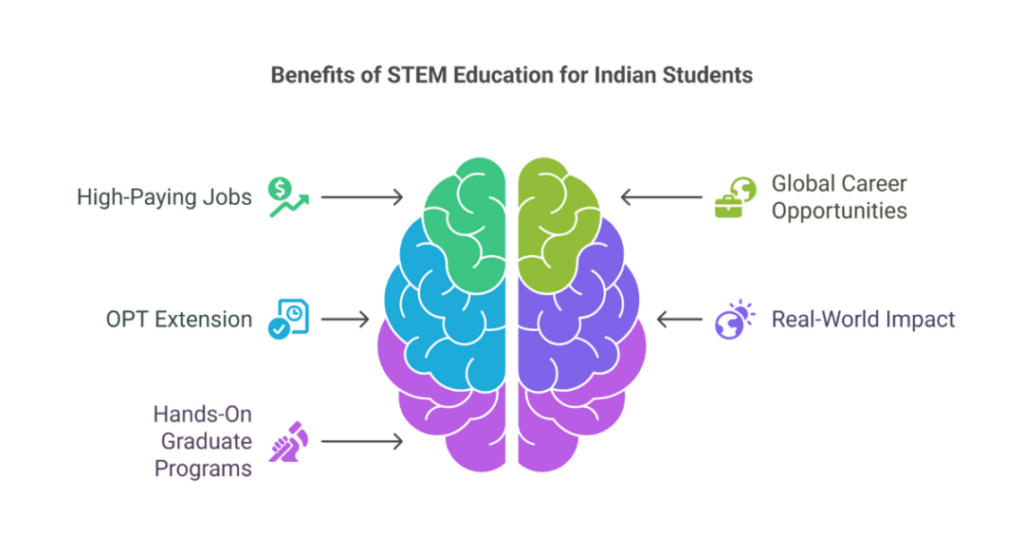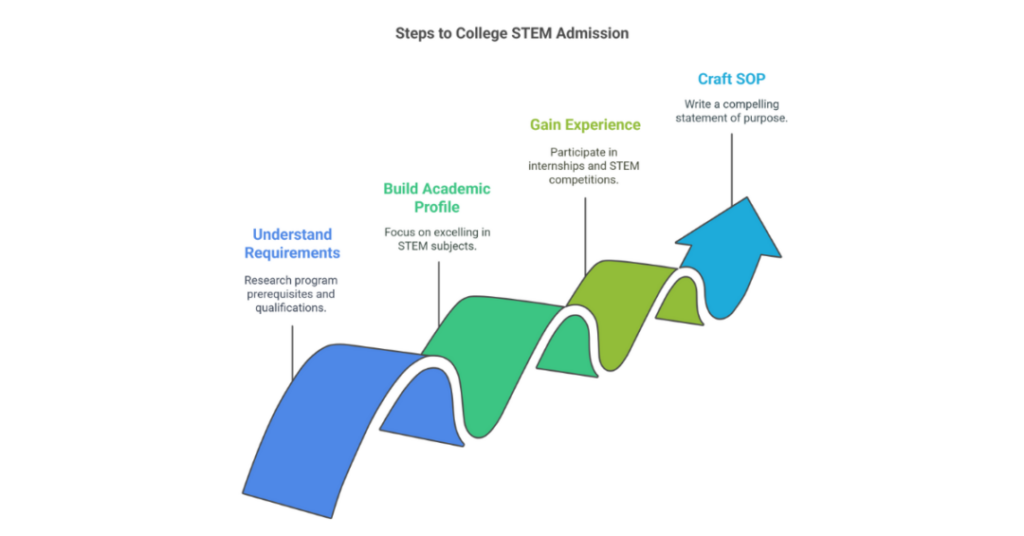9 June 2025
5 minutes read
10 Top College STEM Programs for Indian Students: Best Destinations, Courses List & Tips

Key Takeaways
- College STEM programs offer access to high-paying, in-demand jobs across fields like data science, computer engineering, and bioinformatics.
- Early preparation in core subjects like mathematics and science is key to standing out in competitive admissions.
- Choosing the right program and country enhances your chances of OPT extension and long-term career growth in STEM disciplines.
Over 75% of STEM jobs are in computing, engineering, and advanced mathematics, yet many Indian students apply to college STEM programs without a clear strategy or awareness of in-demand skills. Let’s be real, most jump in just because they “like science,” not knowing which STEM courses actually lead to high-paying jobs or OPT extension opportunities.
This guide cuts through the noise, breaking down STEM disciplines, graduate programs, and the real career path you need to succeed as an international student.
Why STEM Programs Are a Smart Choice for Indian Students?
College STEM programs offer Indian students access to high-paying, in-demand jobs across science and engineering, from computer science and biochemistry to robotics and cybersecurity.

A STEM degree in fields like mathematics, mechanical engineering, or aerospace engineering opens doors to global career opportunities, OPT extension, and real-world impact. With STEM education in top universities offering hands-on graduate programs, international students can master STEM subjects and build a solid career path in the U.S and beyond.
Top Countries Offering World-Class STEM Programs for Indian Students
For Indian students looking to excel in college STEM programs, choosing the right country is everything. From bioinformatics to chemical engineering and applied mathematics, STEM fields are booming globally, with high demand across science and technology sectors.
Whether it’s the University of Maryland (UMD) near NASA Goddard or top research universities in Europe, STEM students can access popular STEM courses, OPT extension, and career opportunities. Here’s a quick guide to the best countries offering STEM majors to study abroad.
| Country | Popular STEM Fields | Top Universities/Institutes | Highlights |
|---|---|---|---|
| USA | Computer Engineering, Software Engineering, Data Science | MIT, Stanford, UMD College Park, Georgia Tech | STEM-eligible, OPT extension, Bureau of Labor Statistics job growth |
| Canada | Environmental Science, Bioinformatics, Mathematics | University of Toronto, UBC, McGill | PR pathways, certificate programs, transfer-friendly |
| Germany | Engineering and Mathematics, Information Science | TU Munich, RWTH Aachen, Heidelberg University | No tuition fees at public colleges and universities |
| UK | Natural Sciences, Chemical Engineering, Formal Sciences | University of Oxford, Imperial College London | One-year master’s degree programs, strong research culture |
| Australia | STEM-related fields, Field of Engineering, Applied Math | University of Melbourne, ANU, UNSW | Work permits, high student interest in science programs |
| Netherlands | Mathematics and Statistics, Science and Engineering | Delft University of Technology, University of Twente | Innovative academic departments, English-taught doctoral tracks |
| Singapore | Computer Science, Engineering Department, Hard Sciences | NUS, NTU | Global tech hub, F-1 equivalent student visa with job prospects |
Most In-Demand Best STEM Courses Indian Students Are Choosing in 2025
In 2025, Indian students enrolling in college STEM programs are leaning toward high-paying, fastest-growing fields that align with real-world needs. From math and statistics to data science, these STEM-eligible disciplines help international students interested in studying STEM build math skills, meet minimum score thresholds, and enter the workforce confidently.
The complete list of STEM options spans 4 types: natural sciences, formal sciences, engineering, and technology, offering various career paths across numerous academic disciplines.
| STEM Course | Field of Science | Career Outlook | Why Indian Students Choose It |
|---|---|---|---|
| Data Science | Formal Sciences | Jobs require data skills, among fastest-growing | Works across numerous fields, high paying |
| Computer Science | Technology & Engineering | Essential in AI, cloud, and software fields | Underrepresented areas now have increased demand |
| Mechanical Engineering | Engineering | Evergreen jobs in core sectors | Strong base, available in most universities around |
| Math and Statistics | Formal Sciences | Strong demand in finance and analytics | Bachelor’s degree leads to various career paths |
| Bioinformatics | Natural Sciences | Rising use in genomics and biotech | Supports humanity via medicine and biology |
| Environmental Science | Natural Sciences | Important for the sustainability and energy sectors | Combines science and impact, study stem courses abroad appeal |
| Cybersecurity | Technology | One of the most in-demand global careers | Needs sharp logic, like data, offers job security |
| Applied Mathematics | Formal Sciences | Supports modeling in physics, economics, and AI | Favored by professors and chairs globally |
| Chemical Engineering | Engineering | Needed in pharma, materials, and energy | Offers high paying roles and global mobility |
| Information Science | Interdisciplinary | Drives decisions in business and tech | Great fit for transfer students from different backgrounds |
How to Prepare Early for College STEM Programs as an Indian Student?
To stand out in college STEM programs, Indian students need to start preparing early. Focusing on building strong foundational skills and exploring various STEM eligible courses can significantly enhance your chances. Here are some key steps to take:
- Focus on Core Subjects: Strengthen your knowledge in mathematics, science, and engineering, key components of national science.
- Join STEM Activities: Participate in competitions and internships to increase your exposure to a range of academic disciplines.
- Research and Explore: Dive into STEM programs that align with your interests to prepare students for future success.
Admission Tips for Indian Students Applying to College STEM Programs
Applying to college STEM programs can be a competitive process for Indian students, but with the right preparation, you can significantly improve your chances.

Here are some essential tips to guide you through the admission process:
- Understand the Program Requirements: Each STEM program offers different disciplines and has unique prerequisites. Research thoroughly to know what qualifications, skills, and tests are required for your chosen program.
- Prepare a Strong Academic Profile: Focus on excelling in subjects like mathematics, science, and engineering. Your grades and coursework should align with the STEM field you could study.
- Gain Relevant Experience: Participate in internships, projects, and STEM-related competitions. This will show your commitment and hands-on experience, which admissions committees value highly.
- Craft a Compelling SOP: Your Statement of Purpose should reflect your passion for the STEM field, detailing why you want to pursue that particular STEM major and how it aligns with your career goals.
Conclusion
College STEM programs offer Indian students unparalleled opportunities to advance in some of the most in-demand and high-paying fields worldwide. By choosing the right program and preparing early, you can increase the number of doors opened for your future career.
If you’re ready to embark on this exciting journey, Ambitio is here to guide you. As a leading study abroad consultancy, we specialize in profile building to ensure you stand out in a competitive global market.
Get in touch with us today to start shaping your future in STEM! Join Ambitio Elite for expert advice and personalized support.
FAQs
What are some popular STEM courses in college?
Popular STEM courses include computer science, mechanical engineering, biochemistry, data science, and environmental science.
Can studying STEM lead to high-paying jobs?
Yes, many STEM fields are in high demand and offer high-paying job opportunities, particularly in areas like software engineering, data science, and biotechnology.
Are there opportunities for international students in U.S. STEM programs?
Absolutely. Many U.S. universities welcome international students in their STEM programs, often with specific support and resources.
How important is mathematics in a STEM degree?
Mathematics is crucial in STEM education, providing a foundation for understanding and excelling in various STEM disciplines.
Can I study STEM courses abroad?
Yes, many students choose to study STEM courses abroad to gain global perspectives and experience in their field.
Who can apply for college STEM programs?
Eligibility for college STEM programs typically depends on your intended major (such as biology, chemistry, computer science, etc.) and sometimes academic performance or specific application criteria.
Are there scholarships or financial aid for college STEM programs?
Yes, many universities and organizations offer scholarships and financial aid specifically for students in college STEM programs.

You can study at top universities worldwide!
Get expert tips and tricks to get into top universities with a free expert session.
Book Your Free 30-Minute Session Now! Book a call now




























